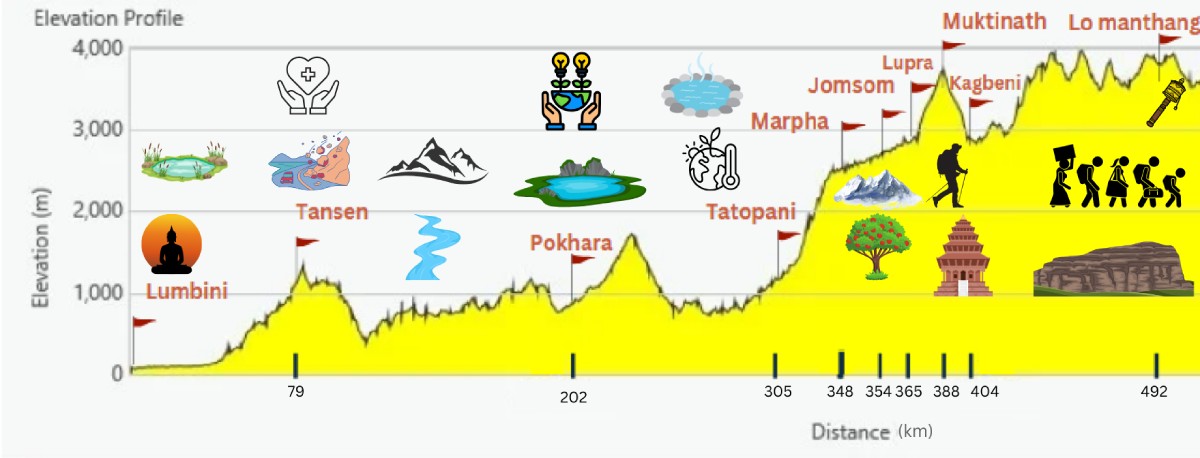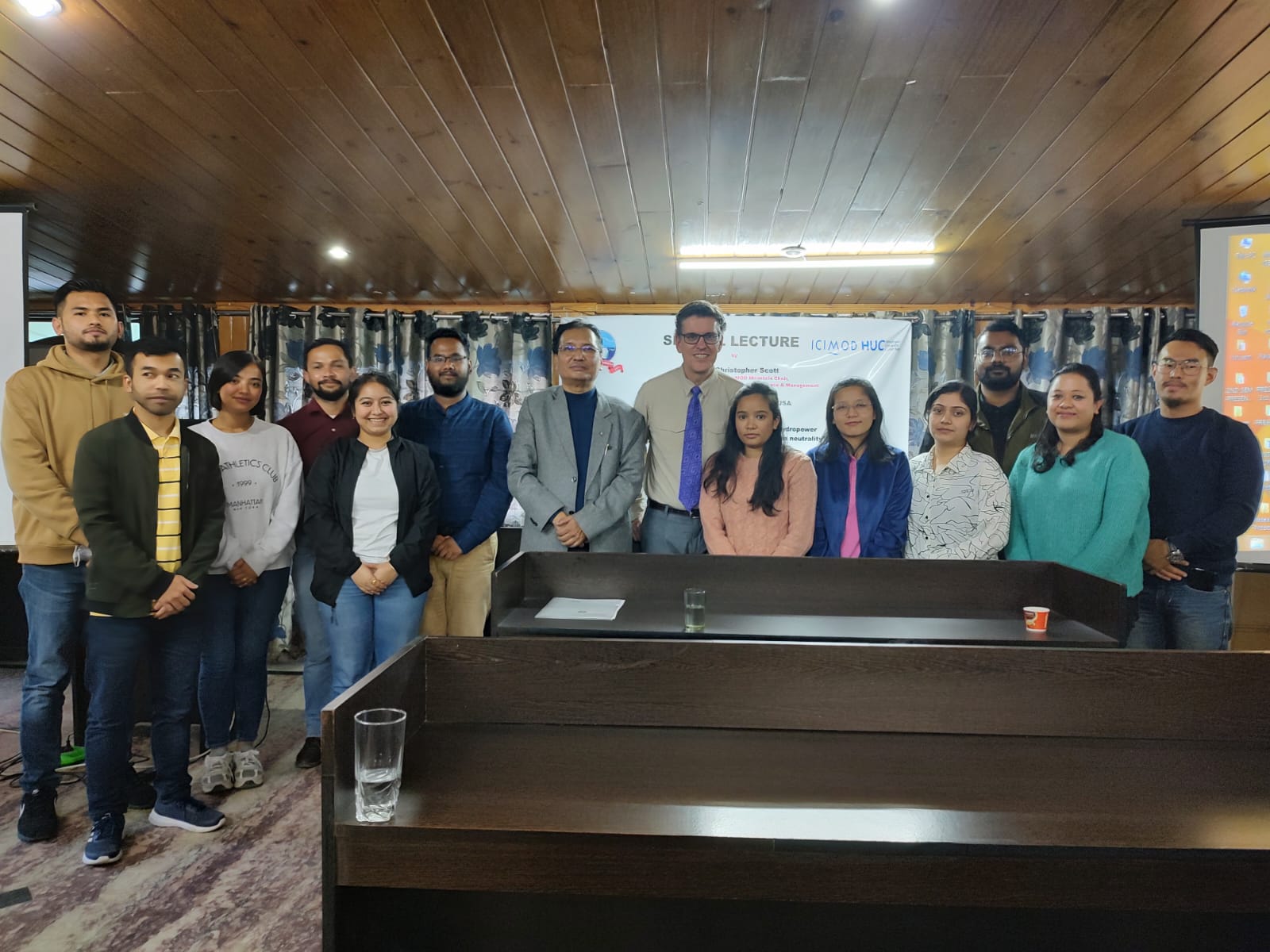Background
The Himalayan University Consortium (HUC) has been a membership-based, apolitical, international academic network within and outside the Hindu Kush Himalayan (HKH) region since 2007. It is committed to safeguarding planetary health by promoting in-country, regional, and international cooperation in research, education, capacity development, policy advocacy, and public outreach for resilient, just, inclusive, and regenerative communities and thriving geo- and ecosystems in the HKH. The HUC envisions a peaceful, resilient, inclusive, just, and regenerative HKH where individuals, communities, and nations make knowledge-based and ethical decisions for life betterment, culture preservation, and environmental regenerability. The Consortium’s mission is to co-create, together with stakeholders, knowledge and build competencies to address local and global challenges pertinent to the HKH peoples and societies by providing unique education, research, capacity building and innovation opportunities through collaboration within a self-reliant and future-fit network of institutional and individual members. The HUC’s nine core values – Mountain focus, Academic excellence, Inclusive, Respectful, Collaborative, Ethical, Open, Influential, and Self-reliant – are the foundation upon which the Consortium builds its consensual alliance.
The HUC governance structure comprises its institutional and individual members, a General Assembly, an Executive Committee (EC), and an Executive Secretary (Secretariat), hosted by the International Centre for Integrated Mountain Development (ICIMOD) in Kathmandu, Nepal.
The Executive Committee and its Responsibilities
The Executive Committee is mandated by the General Assembly to formulate and recommend policies and strategies to the General Assembly and has general responsibility for HUC’s development, for setting its main priorities, and for ensuring an alignment of its activities with them. The EC develops and recommends the strategic plan and major initiatives for the Consortium and oversees the implementation of the strategic goals set by the General Assembly Meeting and the work of the focused project teams or committees. The EC develops and directs the annual work plan of the Consortium, including a clear timeframe for starting and completing each project undertaken by the teams or committees. The EC shall provide guidance and approve proposals, documents on procedures and action plans prepared by the Secretariat and task forces.
The EC has the authority and primary responsibility for:
- strategic planning and setting institutional priorities;
- organizational development and institutional accountability, including making recommendations on membership fees and other charges;
- recommendation of new institutional members to the General Assembly for approval;
- fundraising, finances, and budgeting for the Consortium’s activities;
- public and external relations;
- drafting recommendations for amendments to HUC Bylaws and the HUC Charter;
- selecting and appointing the Secretariat’s Executive Officer/ Director and overseeing induction and handover between outgoing and incoming Secretariat.
The Executive Committee consists of elected individuals, numbering from seven to thirteen, including one representative from each of the eight HKH countries, two representatives from non-HKH members, one representative from the hosting institution where applicable, one representative from early or mid-career cohorts, and one representative from Indigenous or tribal communities, but will always consist of an odd number of members. The EC shall seek, as much as possible, to achieve at least 40% female and 30% early-/mid-career representativeness.
Each member of EC serves a 4-year term, non-renewable. EC membership is a community service without monetary remuneration.
The two vacant seats – representing early or mid-career cohorts and representing Indigenous or tribal communities – are open for nomination at this time.
Qualifications and Experience
Executive Committee Members (ECMs) shall be active researchers, scholars, or educators with outstanding academic achievements and a track record of regional and international cooperation in the HKH. Specific qualifications and experience include:
- Outstanding scholarly achievements in any academic field with a strong focus on mountain issues and HKH specificities.
- Experience in fostering regional and international collaboration in research, education, and capacity development in one or more countries of the HKH.
- Experience in stakeholder engagements such as policy translation and policy consultation at the local and national level in one or more countries in the HKH. Experience in science-based advocacy is highly desirable.
- Experience in resource mobilisation at national and, desirably, international levels.
- Practical familiarity with the HUC’s approach and recognizable credibility among key HUC constituencies would be an advantage.
Eligibility for nominations for ECM representing early or mid-career cohorts: lecturer or assistant professor, or within 10 years from the completion of a PhD, or 15 years from the completion of a Master’s degree.
Eligibility for nominations for ECM representing Indigenous or tribal communities: self-identification is strongly encouraged; elaborations on the impact of this self-identification in the nominee’s academic career and advocacy are required in the Letter of Interest.
Nominees should demonstrate commitment to the mission and values of the HUC, willingness to devote time and energy to its activities, demonstrated judgment, freedom from conflicts of interest with the HUC, professionalism and personal integrity.
Process
Nominations can be made by any member of the General Assembly, institutional or individual. Institutional endorsement is required for self-nomination. Considerations of gender balance, inclusiveness and geographical and academic disciplinary diversity should be taken into account in the nomination of ECMs, with emphasis placed on women’s leadership.
A nomination dossier includes a Nomination Letter by the Head of Institution or a respective officer deemed appropriate; an academic Curriculum Vitae; and a Letter of Interest by the Nominee, specifying the vacant seat applied for in the Subject line, to be submitted to the HUC Secretariat at Chi.Truong@icimod.org and huc@icimod.org no later than 23:59hr local time Monday 16 June 2025.
The Executive Committee will review the nominations and make recommendations to the General Assembly for an open election by members.
Deadline: Call for Nominations is open from 2 June through 16 June 2025; extended to 23 June 2025.


